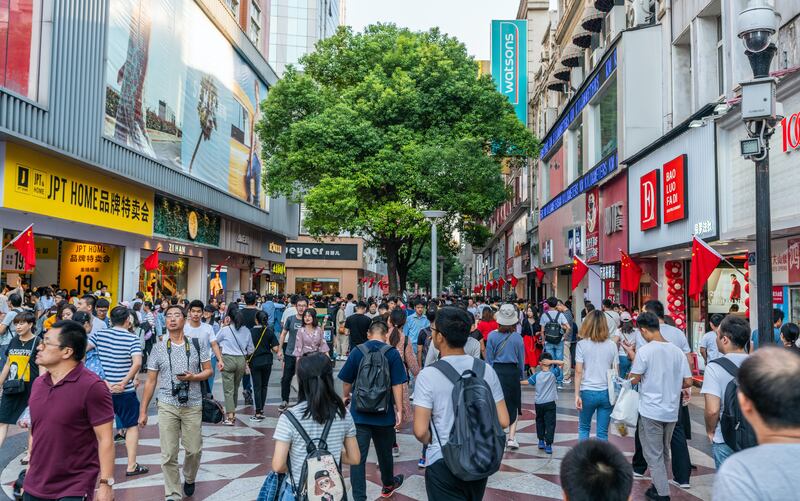Discover the most recent and relevant industry news and insights for fashion professionals working in marketing, to help you excel in your job interviews, promotion conversations or simply to perform better in the workplace by increasing your market awareness and emulating market leaders.
BoF Careers distils business intelligence from across the breadth of our content â editorial briefings, newsletters, case studies, podcasts and events, as well as the exclusive interviews and conversations we have with experts and market leaders every day â to deliver key takeaways and learnings in your job function.
Key articles and need-to-know insights for marketing professionals today:
1. Inside Nikeâs Big Marketing Vibe Shift

Nikeâs identity crisis began in the wake of a 2018 leadership shakeup that led to the exit of several top executives, including Trevor Edwards, president of the Nike brand, and continued as John Donahoe took the reins as chief executive in 2020. Now, Nike veteran Nicole Hubbard Graham, a close associate of Edwards who rejoined the company as CMO in January, is co-piloting a push to restore the brandâs marketing glory with a playbook that takes a page from its golden era. âDo I think Nike â along with a lot of other people â stopped believing that the power and magic of sport and the notion of winning could continue to grow this brand? Maybe,â Hubbard Graham told BoF.
Nikeâs âWinning Isnât for Everyoneâ campaign, which launched just before the start of the Olympics, asked whether star Nike-sponsored athletes, including LeBron James, Cristiano Ronaldo and ShaâCarri Richardson were âbad peopleâ for wanting to win at all costs. It was a significant vibe shift from the less combative, more inclusive tone Nike has struck in recent years, directly challenging the âeveryoneâs a winnerâ mentality that had taken hold in wider American culture in a way that harked back to the bold ads of the brandâs glory days.
Related Jobs:
Social Media Coordinator, Burberry â London, United Kingdom
Head of Brand, On â Zurich, Switzerland
Marketing Executive, Seiya Nakamura 2.24 â Tokyo, Japan
2. Why Fashionâs New Leading Man Looks So Familiar

After two decades as a journeyman actor, Glen Powell has gone on a leading man run rarely seen in todayâs entertainment-sphere. After starring in the rom-com hit âAnyone But You,â action flick âHitman,â and now, âTwisters,â heâs frequently discussed on social media and in the press in the same breath as Gosling, Cruise, Clooney, Pitt, Smith and other four-quadrant stars.
Fashion loves a new face. What makes Powellâs rapid ascent so interesting is that he isnât, particularly: with his hair, jawline and traditional wardrobe, the actor represents a clean break from risk-takers like Jacob Elordi, Timothee Chalamet, Donald Glover, Colman Domingo, Pedro Pascal and Austin Butler who have dominated red carpet coverage and menswear blogs over much of the last decade. âItâs really hard to penetrate the culture across various segments of society these days,â said Doug Shabelman, chief executive of Burns Entertainment, which matches talent with brands. âYou could see [Powell] doing an ad for pretty much everybody.â
Related jobs:
Brand Marketing & PR Manager, Anest Collective â Milan, Italy
Communications Manager, Zoï Agency â Toronto, Canada
Public Relations and Marketing Manager, Alexander McQueen â Shanghai, China
3. How Chinaâs Fashion Industry Is Leveraging the Olympics

From Christian Dior to Fenty Beauty, fashion and beauty brands from across the globe have gained exposure from the Paris Olympic Games. The biggest winners in China might end up being Maogeping, a cosmetic brand enlisted by the country to be its official team provider. Helmed by its namesake founder Mao Geping, the brand is on site to ensure the countryâs 400-plus athletes present their best selves on and off camera.
The partnership has spawned its own hashtag, #TheGloryofChinainParis in Chinese, clocking up millions of views across social media platforms Weibo, Xiaohongshu and Douyin. A more lasting reminder of the brandâs intimate connection with Chinaâs top athletes â a new class of celebrity in the country â is Maogepingâs Olympic-themed makeup range. So far, Chinaâs fashion industry has focused on coverage of sporting heroes like Zheng Qinwen, a tennis champion who looked immaculate blasting her opponents on the court in Paris, and off-duty images of Wu Yanni, a hurdler who makes headlines as much for her tattoo and makeup routines as for her speed on the track.
Related Jobs:
Paid Social Media Manager, Carhartt WIP â Berlin, Germany
External Communications Intern, Koibird â Madrid, Spain
Senior Content Associate, Chalhoub Group â Dubai, United Arab Emirates
4. Fashion Triumphs and Missed Opportunities at the Paris Olympics

The summer Olympics in Paris are a pivotal moment for sportswear brands, and this year proved to be the biggest. Average viewership for the first ten days of the Olympics reached 33 million, up 80 percent from the 2021 Tokyo games, according to data from NBC Sports. Nike ambassador Simone Biles took home three gold and one silver medal, becoming the most decorated gymnast in Olympics history.
The US womenâs gymnastics team all wore Nikeâs Air Max DN sneakers on the winnersâ podium while taking home the gold medal for their knockout performance. Yet, after the opening ceremony, many opportunities for fashion to nudge in on the huge cultural moment fell flat, or were left unattempted. Coverage of VIP attendees and their looks was limitedâa surprising turn for what many had expected to be fashionâs biggest Olympics.
Related Jobs:
PR & Influencer Assistant, De Mellier â London, United Kingdom
Events Assistant, British Fashion Council â London, United Kingdom
Freelance Influencer Specialist, KCD â New York, United States
5. Why Retailers Should Stop Worrying About the Gen-Z Versus Millennial Divide

As Gen-Zers hit their mid-20s, the style gap between that generation and their slightly older peers is rapidly widening. For brands and retailers hoping to serve customers both over and under the age of 25, the viral Gen-Z versus Millennial divide presents a conundrum: How to join the latest trends without alienating older, more conservative shoppers? While Gen-Z may be inventing new styles, itâs Millennials who still hold the spending power.
The average American shopper between ages 35 and 44 spent $2,632 on apparel in 2022, according to the US Bureau of Labor Statistics, more than double the cohort under 25.Brands should not plan their assortment around how many of their customers are fashion-forward Zoomers and how many are risk-averse Millennials, trend analysts said. Instead, the key is to make products accessible to everyone through merchandising and a targeted marketing strategy.
Related Jobs:
Senior Product Marketing Manager, Joor â London, United Kingdom
Social Content Producer, Marla Aaron â New York, United States
Manager, Special Events, Tiffany & Co. â New York, United States
6. How Fashion Can Nail the Tricky Details of Sports Partnerships

In May, Gucci released a campaign with Italian tennis star Jannik Sinner featuring a Gucci-logoed bag on his shoulder, waving to an imagined audience. Four words splayed across the photograph as he carries a non-white Gucci bag onto the court at Wimbledon: âGucci is a feeling.â Also front and centre, though, was the Nike swoosh on Sinnerâs hat. Luxury fashion brands are known for keeping tight control over where and how their products appear. They place strict full-look requirements on magazine editors and the influencers they invite to their runway shows. So why would Gucci and Louis Vuitton cede space to brands like Nike and Rolex in ads? Likely they didnât have any other choice.
Sinner has a $158 million, 10-year deal with Nike. Typically, those sorts of partnerships come with exclusivity clauses and obligations, which means that when fashion brands want to work with athletes, it often means dealing with other brands. Still, working with athletes sometimes means that fashion brands must be willing to share the spotlight, even in their own advertising.
Related Jobs:
Head of Press, Erdem â London, United Kingdom
In-House Press Office Coordinator, Vetements â Zurich, Switzerland
Showroom Coordinator, Cabine Creative â Los Angeles, United States
7. Chinese Swap Handbags for Trips as âExperience Economyâ Booms

A shift in Chinese consumption patterns is underway, with people spending more on services even as they remain thrifty and refrain from splurging on goods. This has made services a bright spot in otherwise sluggish consumption, which has weighed on LVMH Moët Hennessy Louis Vuitton SE and prompted Apple Inc. to cut prices. Retail sales of services grew 7.5% percent in the first half of the year compared with the same period in 2023, while goods sales rose just 3.2 percent.
With services at just about 50 percent of gross domestic product, the sector has plenty of room to grow before reaching the 75 percent level seen in the US or the European Union. And with manufacturing cooling and threatened by tariffs, greater domestic consumption of services would help Chinese factory owners withstand external shocks. Recognising the potential of the services sector and the need to identify domestic growth drivers, Chinaâs cabinet â the State Council â announced sweeping measures last week to improve the supply of services. The 20 key actions include boosting spending on dining, tourism, and accommodation for travellers.
Related Jobs:
Senior CRM Manager, Carhartt WIP â Berlin, Germany
Post Production Specialist, Tiffany & Co. â New York, United States
Internal Communications Director, Banana Republic â San Francisco, United States
8. True Religionâs Hip-Hop Powered Comeback

Back in 2008, when its horseshoe logo was synonymous with the decadeâs premium denim boom, the brand received nods from Drake and Kendrick Lamar, as well as Chingy and Soulja Boy. In the 2010s, callouts came courtesy of Chief Keef, 2 Chainz (who named a whole mixtape after the brand in 2011), 50 Cent and others. But even as suburban teens moved on â piling into athleisure or buying lower-priced jeans from brands like Leviâs and Abercrombie & Fitch â rappers never seemed to shake their affinity for the horseshoe logo and signature thick stitching.
In the 2020s, True Religion popped up in lyrics from Doja Cat, Latto and Sexyy Red. âTrue Religion, I feel like a stallion, horseshoes on my ass (Woo),â recites Memphis, Tennessee, rapper Glorilla in her signature country twang on âAccentâ by Megan Thee Stallion, released just last month. That cultural cred â and a post-bankruptcy plan that slashed prices for the brandâs jeans to about $100 â is starting to pay off. Sales increased by about 20 percent to $280 million last year, with $80 million in earnings before interest, taxes, depreciation and amortisation.
Related Jobs:
Content Editor, De Mellier â London, United Kingdom
Marketing Assistant, Burberry â London, United Kingdom


